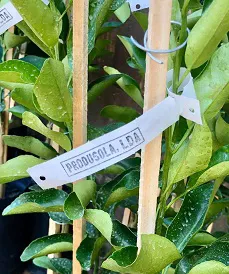 Produsola is a nursery in Messica, Manica expanding its core business of supplying fruit growers in Mozambique, Zimbabwe, Malawi and Zambia to now establishing its own orchards.
Produsola is a nursery in Messica, Manica expanding its core business of supplying fruit growers in Mozambique, Zimbabwe, Malawi and Zambia to now establishing its own orchards.
The nursery propagates and supplies citrus, mango, litchis, avocado and macadamia trees, plus vegetable seedlings and ornamentals as well as indigenous trees.
“Nursery sales are not consistent and if I do my job properly in providing good quality trees, then I’m not going to get repeat business,” explains Danielle Clyde-Wiggins who joined the nursery on the banks of Lake Chicamba, 40km west from Zimbabwe, in 2016.
She likes bringing in unusual plants to their portfolio and has been growing and harvesting cinnamon and vanilla pods.
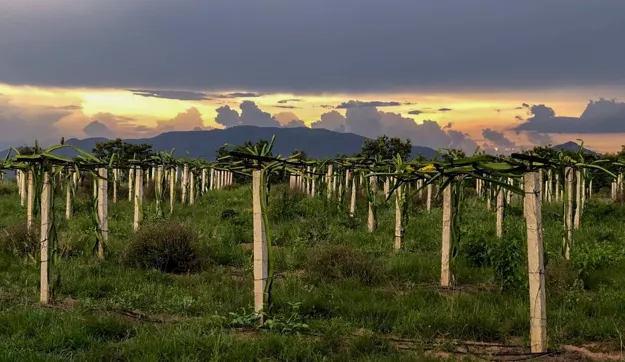 Their varietal trials are already showing that some dragonfruit perform better than others (photos supplied by Produsola)
Their varietal trials are already showing that some dragonfruit perform better than others (photos supplied by Produsola)
She has long been interested in dragonfruit, and last year the test blocks were expanded to become the first dragonfruit plantation in central Mozambique.
“Dragonfruit aren’t fussy and they have a lovely root structure. It’s an incredibly forgiving plant for a fairly hostile environment. I think dragonfruit has a lot of potential, but I do think variety is going to be key in our area. We have already seen that some varieties don’t do too well in our intense heat, while others excel.”
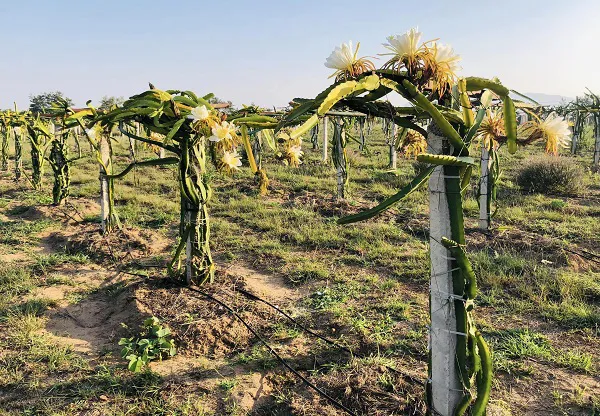 Initially she'd been advised that hand pollination would be required, but insect pollinators have been abundant on dragonfruit flowers
Initially she'd been advised that hand pollination would be required, but insect pollinators have been abundant on dragonfruit flowers
The dragonfruit flower at the end of October, beginning of November which, she remarks, is the worst time being so dry, but once the first rains start, fruit set is very good.
The harvest in Manica is anticipated to be from the end of January until the end of April; it would be earlier in Mozambique’s tropical coastal areas like Beira and Vilanculos, she remarks.
“Dragonfruit really likes the humidity which we have when we get the first rains. South Africa’s climate is a little bit kinder than what we have here.”
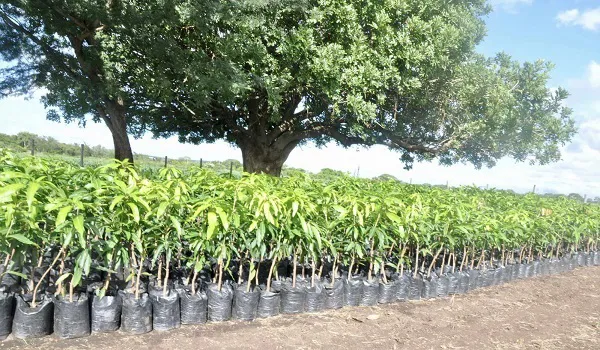 Mango trees waiting to be loaded for a customer
Mango trees waiting to be loaded for a customer
Pomegranates surprise with their performance
“My little plot is a very difficult piece of land to farm. Avocados and macadamias don’t do well here. We’ve got very high pH soils on the banks of Lake Chicamba, because we’re basically on shallow rocky soils.”
Produsola propagates a high number of litchi trees through air-layering. Litchis have always grown well in this area and are popular in the local markets, she remarks, and they have been establishing their own litchi orchards.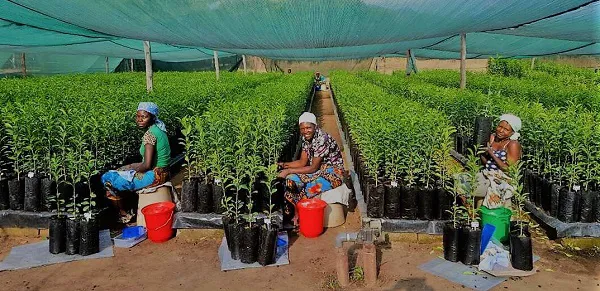 "Our team of budding staff have all been trained by Produsola at Produsola. Many of them never having had a job before, they all now have a specialised skill, and play a crucial role in production," observes Danielle
"Our team of budding staff have all been trained by Produsola at Produsola. Many of them never having had a job before, they all now have a specialised skill, and play a crucial role in production," observes Danielle
A recent surprise has been the performance of pomegranates in their test blocks.
“I put in a test block of pomegranates and they did exceptionally well, which I wasn’t expecting. I grafted the young trees from an old tree we have here, an uncertain variety. We’ve now put in a hectare.”
The pomegranates they harvest are intended for the local market.
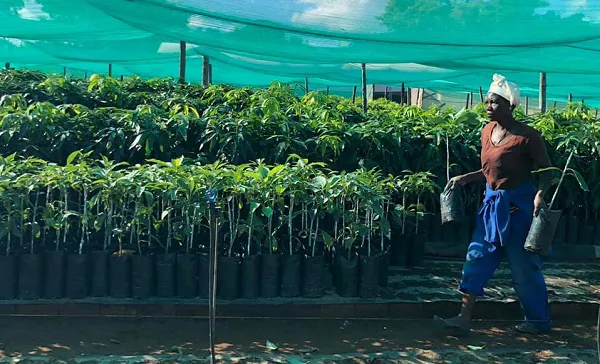 Hass avocado trees for customers across the subregion
Hass avocado trees for customers across the subregion
“If you keep the natural bush there, you have the predatory insects”
Danielle says that when she moved to the land in 2016, she immediately put a stop to any further deforestation and bush clearance.
“The first thing when I moved to the farm, was to let the bush come back because it provides natural pest control. If you keep the bush there, you have the predatory insects. We hardly spray. We never use chemicals in our orchards or in our mother blocks.”
She continues: “We haven’t had the excessive use of pesticides they’ve had in South Africa and they’ve had in Zambia. We still have a lovely balance of insects.”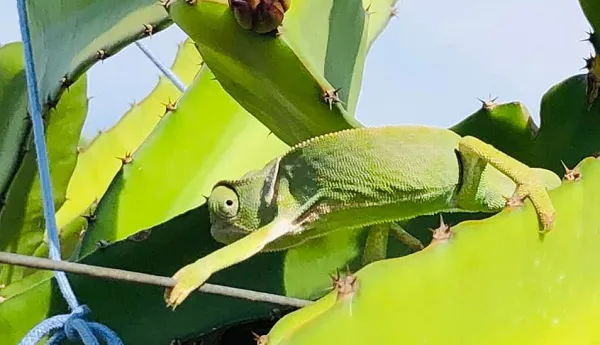 A chameleon on a dragonfruit cactus at Produsola, where no chemicals are used in the orchards or mother blocks
A chameleon on a dragonfruit cactus at Produsola, where no chemicals are used in the orchards or mother blocks
When she was establishing the dragonfruit, the general assumption was that she’d need to hand pollinate the flowers, especially with the varieties they were planting but to date, she hasn’t had to do that at all.
“We’ve got a wonderful wild bee population. We don’t have to introduce anything,” she says. “Our bee colonies are quite small, even though we have a lot of them. Bee colonies are harassed by locals so my aim is to put in hives and create a safe space for the bees where colonies can grow larger.”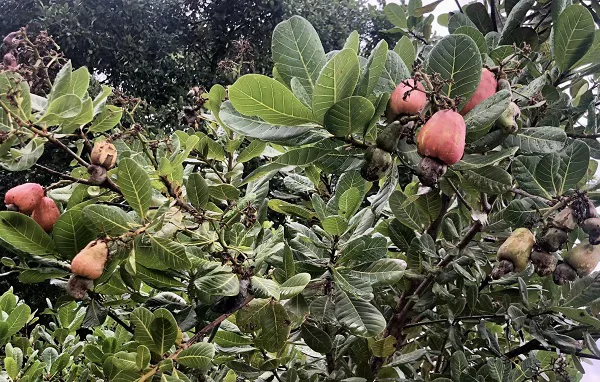 Cashew apples containing the cashew nut, historically an important crop in Mozambique
Cashew apples containing the cashew nut, historically an important crop in Mozambique
Natural bush slowed down Cyclone Idai’s winds
And then there was Cyclone Idai. An awful event, she says.
It remained over Mozambique for more than two weeks in March 2019 and according to Unicef, left more than 600 people dead. “When the rivers came up – some villages just disappeared. Gone. No trace of them,” she says.
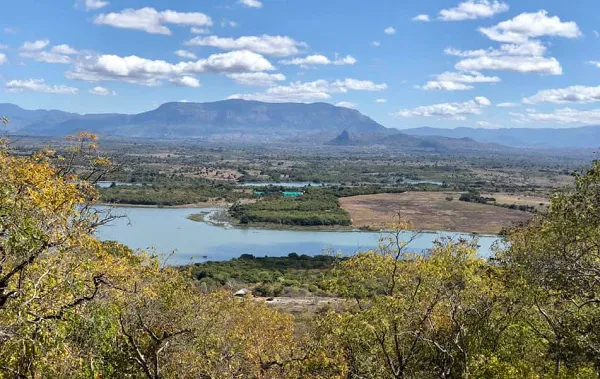 A view over Produsola nursery on the banks of Lake Chicamba with Casa Msika Mountain at the back
A view over Produsola nursery on the banks of Lake Chicamba with Casa Msika Mountain at the back
At Produsola, the roofs of the propagation houses were blown off and they lost 70% of their production during Cyclone Idai.
“But that was nothing in comparison to our neighbours in Beira. We definitely got off lucky. We’re quite fortunate where we are: there’s still quite a lot of bush around and we’re in a little bit of valley. The vegetation cover slowed down wind speeds, I felt that.”
She continues: “For us at Produsola it was more about preserving what little bush and trees were left in the area and protecting that, which unexpectedly has saved us from several cyclones and winds.”
Produsola now offers indigenous trees such as cassia, faidherbia, mahogany and msasa (“and really any other seeds I find around the farm”) as part of a reforestation initiative. Development aid sometimes comes with the proviso that indigenous trees be planted as part of a project.
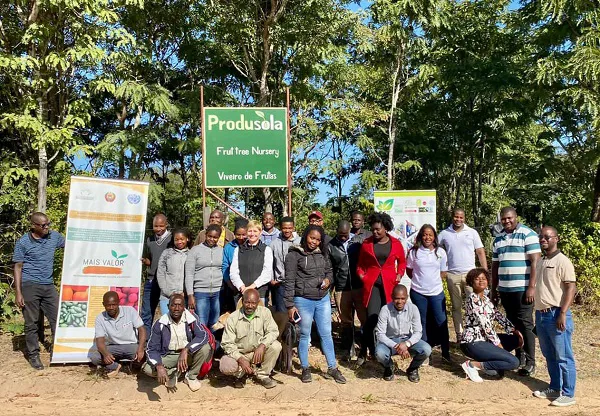 Produsola regularly welcomes agriculture students from various institutions for practical training
Produsola regularly welcomes agriculture students from various institutions for practical training
 For more information:
For more information:
Danielle Clyde-Wiggins
Produsola Limitada
Tel: +258 86 929 2901/+258 82 895 6006
Email: produsola.danielle@gmail.com
